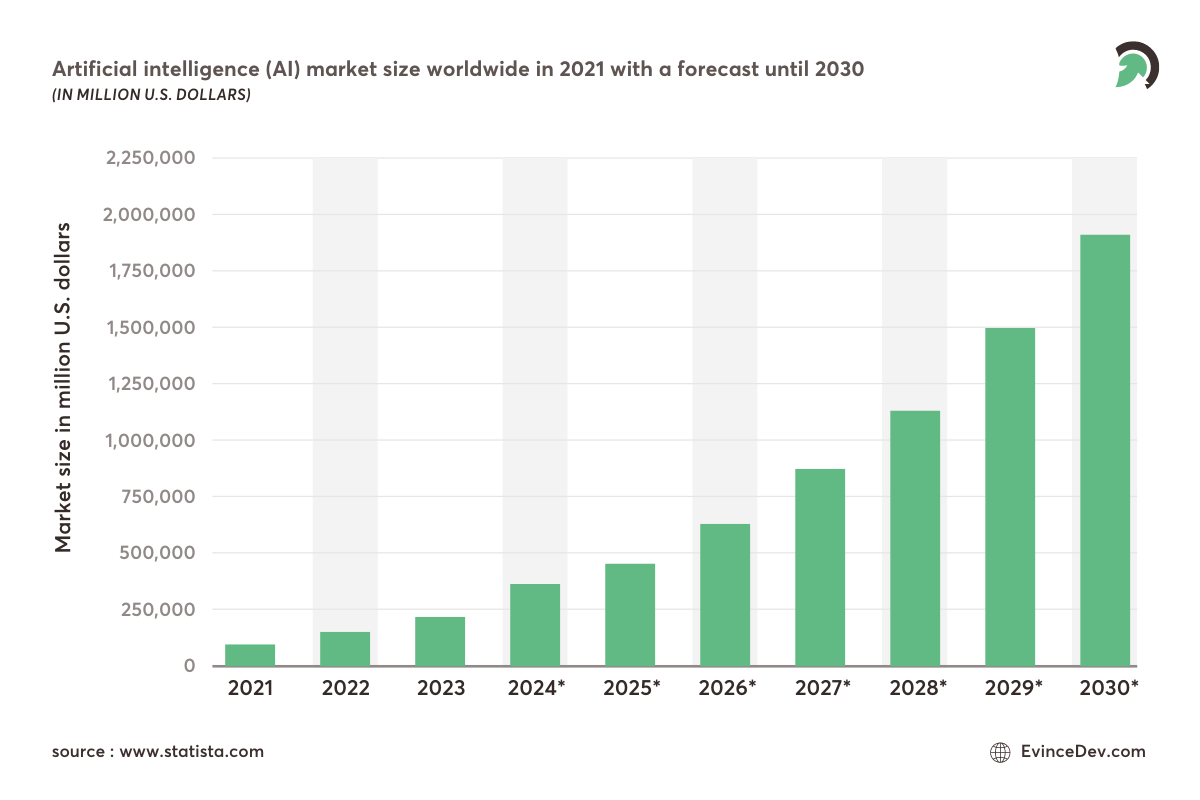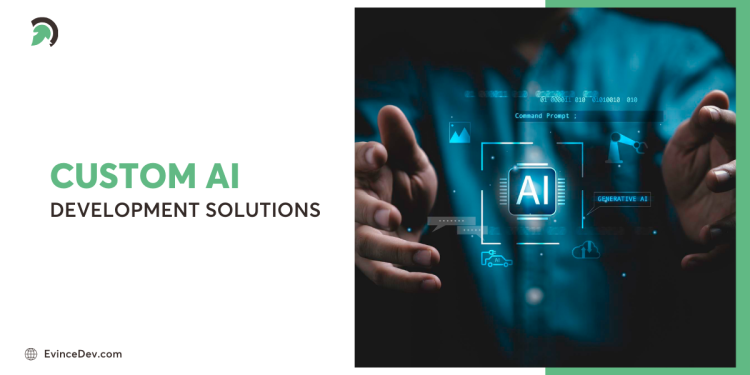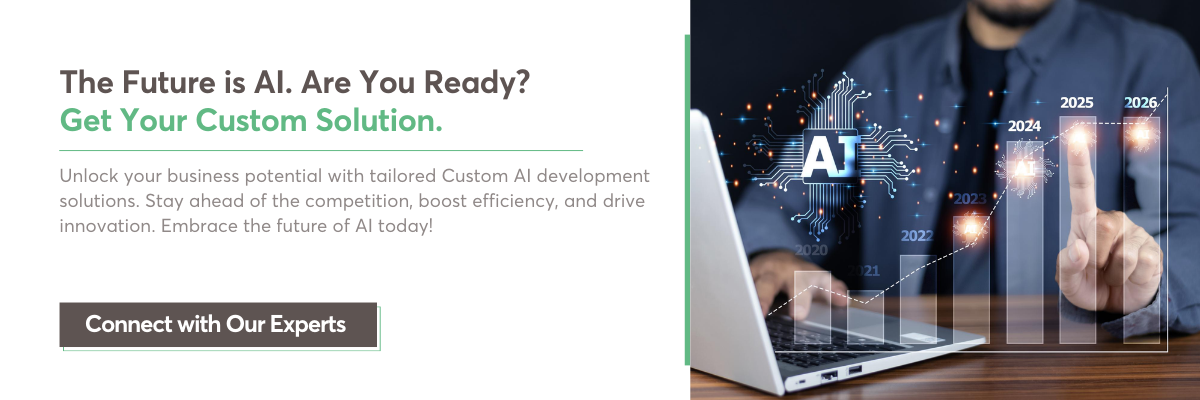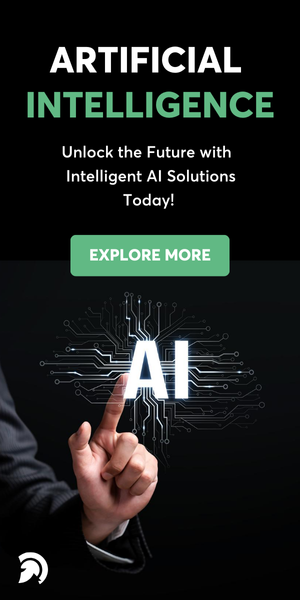In the rapidly evolving digital world, businesses continually seek innovative ways to stay competitive, improve efficiency, and enhance customer experiences. One of the most transformative technologies enabling such advancements is Artificial Intelligence (AI).
Also, AI’s potential to revolutionize industries is vast, but utilizing its power requires more than just understanding its basics.
That’s where AI software development solutions come into play. Custom AI solutions to address unique business challenges can significantly enhance operational capabilities and drive growth.
In the comprehensive guide, we’ll explore how to develop custom AI solutions for specific business problems, from understanding the fundamentals of AI to the step-by-step custom AI development process.
What Is Custom AI Development?
Custom AI development involves creating AI systems to meet a business’s unique needs and objectives. Unlike generic AI development solutions, custom AI systems handle specific tasks, datasets, and operational requirements.
Such an approach ensures that the AI implementation aligns perfectly with business goals, providing more relevant and impactful results.
Essential Components Of Artificial Intelligence
Data: Data is the backbone of any AI system. It includes the raw information that the AI model uses to learn and make decisions.
High-grade, related data is essential for training accurate and effective AI models. Data can come from various sources, including customer interactions, transaction records, sensor data, etc.
Algorithms: Algorithms are the mathematical rules and logic that dictate how the AI processes data. They define the steps the AI system takes to recognize patterns, analyze data, & make predictions or decisions.
Different AI tasks require different algorithms, from simple linear regression for basic predictions to complex neural networks for deep learning tasks.
Models: Models are the trained AI systems that perform specific tasks based on the data & algorithms they build with.
A model results from the AI development process, representing the system’s learned knowledge and capability to make predictions or decisions. The models must be trained, tested, and refined to perform accurately and efficiently.
Some Key Statistics To Know
To highlight the growing importance and impact of AI, have a look at some relevant statistics:
- The worldwide AI market was evaluated to be worth over $208 billion in 2023. By 2030, it will be valued at around $2 trillion.

- According to the World Economic Forum, Organizations estimate that AI-based machines perform 34% of all business-related tasks today.
- AI could increase labor productivity by 1.5 percentage points over the next decade.
- 82% of business leaders think using AI tools when responding to colleagues is acceptable.
Several Benefits of Custom AI Solutions Development
Developing custom AI solutions through AI software development companies offers numerous significant benefits to organizations across various industries.
Tailoring AI to meet specific business needs enables companies to utilize the technology’s full potential, driving growth and competitive advantage. Here’s an in-depth look at how each of such advantages can impact businesses:
Enhanced Efficiency and Productivity
Custom AI solutions can automate many routine and repetitive tasks, significantly freeing human resources to focus on more complex and strategic activities.
By utilizing AI software development services in business workflows, companies can streamline their processes, reduce human errors, and achieve higher productivity.
For example, AI-powered chatbots & virtual assistants can handle customer service inquiries 24/7, providing quick and accurate responses.
Similarly, machine learning algorithms can optimize supply chain operations, manage inventory, and predict demand highly. AI can reduce operational bottlenecks and enhance efficiency by automating data entry, processing transactions, and conducting quality control.
Data-Driven Decision Making
AI solutions analyze vast amounts of data quickly and accurately, transforming raw data into valuable insights that drive informed decision-making.
Custom AI models tailor to a business’s needs, ensuring that the insights generated are highly relevant and actionable. The capability allows organizations to identify trends, forecast outcomes, and make strategic decisions based on real-time data analysis.
For example, predictive analytics can help businesses foresee market trends, customer behaviors, and potential risks, enabling them to adjust strategies and operations proactively. AI-powered data-driven decision-making ensures businesses can stay agile and responsive in a rapidly changing environment.
Personalized Customer Experiences
AI can examine customer data to understand individual preferences, behaviors, & needs, enabling businesses to offer highly personalized experiences.
Custom AI solutions from the best AI app development company can tailor recommendations, marketing campaigns, and interactions to individual customers, enhancing satisfaction and loyalty.
For example, e-commerce platforms can use AI to give personalized product recommendations based on a customer’s previous purchases & browsing history.
In the financial sector, AI can help create personalized investment portfolios for clients depending on their risk tolerance and financial goals. Personalized customer experiences foster stronger relationships and significantly increase customer retention and lifetime value.
Innovation and Competitive Advantage
Developing bespoke AI solutions allows businesses to innovate and differentiate themselves from competitors. Custom AI can design to address unique challenges and opportunities within an industry, providing companies with a significant competitive edge.
By employing AI for product development, process improvement, or the creation of new service offerings, businesses can stay ahead in rapidly evolving markets.
For example, AI can drive innovation in healthcare by aiding in the development of new drugs and personalized treatment plans. In manufacturing, AI can enhance product design and optimize production processes.
The ability to innovate using custom AI solutions ensures that businesses can continuously offer superior value and maintain a leadership position in their respective markets. With a focus on ai solutions development, companies can adapt quickly to changing demands and create industry-specific applications that keep them ahead of the curve.
Enhanced Security and Compliance
AI can enhance security by detecting and responding to threats more effectively than traditional methods.
Custom AI solutions can design to monitor systems for unusual activity, predict potential security breaches, and ensure compliance with regulatory standards. Such a proactive approach to security helps protect sensitive data and maintain regulatory compliance.
For example, AI can analyze patterns in network traffic to identify and mitigate cyber threats before they cause significant damage.
In highly regulated industries like finance & healthcare, AI can help ensure that all operations adhere to stringent compliance requirements, reducing the risk of costly penalties and reputational damage.
Scalability and Adaptability
Custom AI solutions can build to scale with a business’s growth and can handle increasing amounts of data, users, and transactions without compromising performance.
Such solutions can adapt to meet changing business requirements and technological advancements, ensuring long-term relevance and effectiveness.
For example, as a business expands into new markets, custom AI systems can adjust to accommodate new languages, currencies, and regulatory environments.
Additionally, AI models can be continuously updated and refined to improve accuracy and performance as more data becomes available.
The scalability and adaptability of custom AI solutions ensure that businesses can sustain their growth and remain competitive in dynamic markets.
Different Types of Custom AI Solutions
Custom AI solutions come in various forms, each intended to address specific business needs and challenges. They use different AI technologies and methodologies to provide tailored benefits. Here’s an in-depth look at the different types of custom AI solutions:
Machine Learning Solutions
Machine Learning (ML) is an AI subset that allows systems to learn from data & improve performance over time without being explicitly programmed.
Custom machine learning development services can design to address specific business problems by creating models that analyze data, identify patterns, & make predictions.
- Predictive Analytics: They employ historical data to predict future outcomes, helping businesses make informed decisions. For example, in finance, ML models can forecast stock prices or detect fraudulent transactions.
- Recommendation Systems: E-commerce platforms and streaming services use ML to suggest products or content based on user behavior and preferences.
- Customer Segmentation: ML can analyze customer data to segment audiences into distinct groups based on purchasing behavior, demographics, and other factors, allowing for targeted marketing strategies.
Deep Learning Solutions
Deep Learning (DL) is a dedicated subset of machine learning that utilizes neural networks with many deep neural networks to make complex patterns in large datasets.
Custom DL solutions are particularly effective for tasks that involve image and speech recognition, natural language processing, and more.
- Image Recognition: Such deep learning models can apply for facial recognition, object detection, and medical image analysis. For example, DL can help accurately diagnose diseases in healthcare through medical scans.
- Speech Recognition: DL AI application development services enable voice-controlled applications, virtual assistants, and automated transcription services by accurately converting spoken language into text.
- Autonomous Systems: DL is crucial for developing self-driving cars, drones, and robotics, where the system needs to interpret complex sensory data and make real-time decisions.
Natural Language Processing (NLP)
Natural Language Processing (NLP) focuses on the interaction between computers & human language. It allows machines to understand, interpret, and generate human language.
- Text Analysis: NLP can be useful for sentiment analysis, topic modeling, and summarization, providing insights from large volumes of text data. It helps monitor brand reputation or customer feedback.
- Chatbots and Virtual Assistants: Custom NLP business development services power intelligent chatbots and virtual assistants that can understand & respond to user queries in natural language, enhancing customer service and support.
- Language Translation: NLP models can design for real-time language translation, facilitating communication across different languages in global businesses.
Robotic Process Automation (RPA) Solutions
Such type involves using software robots or “bots” to automate repetitive, rule-based tasks traditionally performed by humans. RPA development services can design to improve efficiency and accuracy in various business processes.
- Data Entry and Migration: RPA bots can automate the extraction, transformation, and loading (ETL) of data between different systems, reducing manual effort and errors.
- Invoice Processing: In finance and accounting, RPA can automate invoice processing, from data extraction to approval workflows, speeding up the accounts payable process.
- Customer Onboarding: RPA solutions can streamline the onboarding process by automating document verification, data entry, and account setup, enhancing the customer experience.
9 Proven Steps to Build Custom AI Software Solutions
Building a custom AI solution involves several critical steps, each requiring careful planning and execution. Here is a step-by-step approach to guide you through the process:
Step 1: Define the Business Objective
Clearly outline the core business challenge you aim to solve using AI. A well-defined objective ensures alignment with organizational goals, measurable outcomes, and effective resource allocation throughout the AI software development process.
Step 2: Conduct a Feasibility Study
Evaluate the technical and financial feasibility of implementing AI. Assess available data, technology stack, budget, and potential ROI to determine whether custom AI development is the right solution for your business problem.
Step 3: Gather and Prepare Quality Data
Data is the foundation of AI success. Collect relevant, accurate, and diverse datasets from trusted sources. Clean, organize, and label the data to eliminate errors and ensure high-quality training for your AI models.
Step 4: Choose the Right AI Technology
Select the most suitable AI technology such as machine learning, deep learning, natural language processing, or computer vision based on the nature of your problem, data availability, and desired functionality for your business application.
Step 5: Develop and Train the AI Model
Use the prepared data to train your AI model, fine-tuning parameters for accuracy and performance. Conduct iterative testing to ensure that the system learns effectively and adapts to real-world scenarios.
Step 6: Validate and Test the Model
Thoroughly test the AI model using separate validation datasets to measure accuracy, reliability, and bias. Identify gaps or performance issues early to refine the model before deployment into production environments.
Step 7: Integrate with Existing Business Systems
Seamlessly connect the AI solution with current business infrastructure such as CRM, ERP, or analytics tools. Integration ensures consistent data flow, automation of workflows, and smooth collaboration across organizational departments.
Step 8: Deploy and Monitor Performance
After integration, deploy the AI solution into live environments. Continuously monitor its performance using KPIs like accuracy, response time, and cost efficiency to ensure it meets business expectations and remains effective.
Step 9: Optimize and Scale the Solution
Regularly update your AI models with new data to maintain accuracy. Introduce automation, expand functionalities, and scale the solution across departments or regions to maximize long-term business impact and growth potential.
From Concept to Creation: EvinceDev – Your Partner in Intelligent Solutions
Custom AI development is a powerful tool for addressing business problems and driving growth. By following a structured approach, businesses can utilize AI’s capabilities to meet their unique needs.
Moreover, custom AI solutions provide many opportunities for innovation and success, from enhancing efficiency to making data-driven decisions and delivering personalized customer experiences.
Partnering with a custom AI development company like EvinceDev ensures the AI solutions are expertly crafted and implemented.
With their guidance, businesses can fully utilize AI to achieve their objectives & maintain a competitive edge in a rapidly evolving market. EvinceDev’s expertise ensures that each step, from concept to creation, is appropriately executed, leading to sustainable growth and long-term success.
Contact us for a FREE consultation to learn more about AI software development solutions & how our AI software developers transform your visionary concepts into intelligent, actionable solutions.





